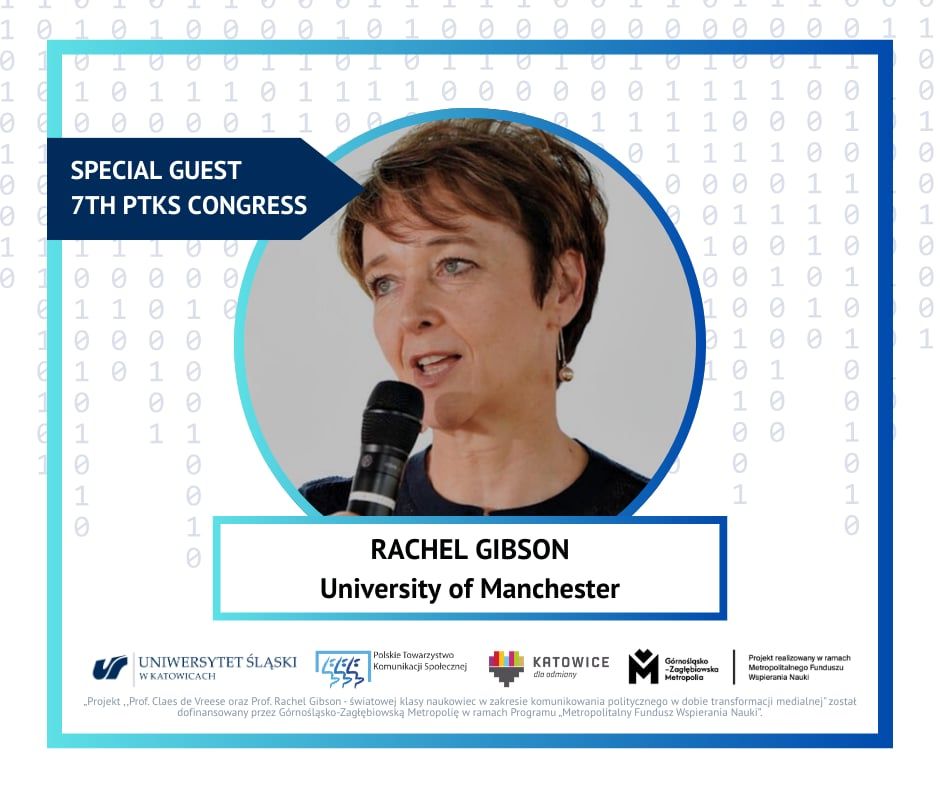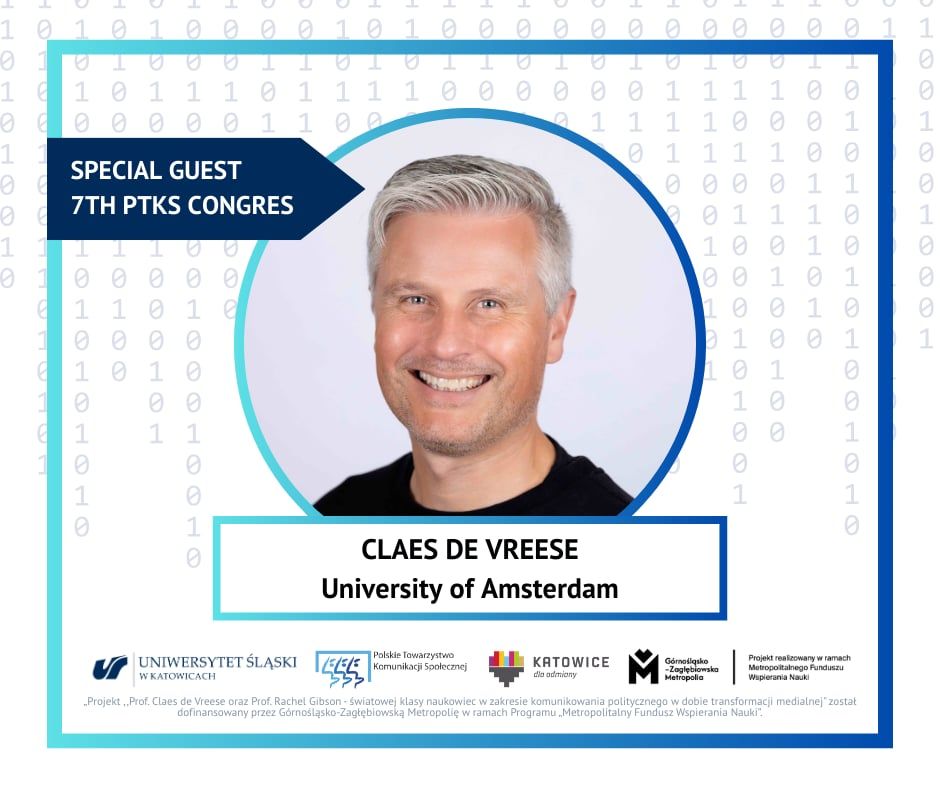
The 7th PCA Congress
HUMAN AT THE CENTER OF CONTEMPORARY MEDIA TRANSFORMATION
Katowice, September 22-24, 2025
Keynote speakers

Prof. dr Rachel Gibson, University of Manchester

Election Campaigns in the Digital Era: Prof. Rachel
Gibson at the 7th PTKS Congress
The internet, social media, and big data have become integral to
contemporary political campaigns, fundamentally reshaping the way
elections are fought. Rachel Gibson, professor of political
science at the University of Manchester, has been studying these
changes for more than two decades. She is also a special guest at
this year's Congress of the Polish Society for Social
Communication, which is co-organized by the Institute of
Journalism and Media Communication at the University of
Silesia.What do her findings reveal about the impact of new
technologies on electoral processes?
Gibson is the author of numerous publications, including the
influential book When the Nerds Go Marching In (2020),
which provides a systematic analysis of the evolution of digital
campaigning in the UK, Australia, France, and the United States.
In other key works—such as Does Digital Campaigning Matter?
(Gibson, Southern, Vaccari, Smyth & Musayev, 2024) and Scientific
and Subversive: The Two Faces of the Fourth Era of Political
Campaigning (Römmele & Gibson, 2020)—she examines the
role of social media engagement in campaigns and explores the
dual nature of digitalization: as a force for democratic
participation, and simultaneously as a tool for political
manipulation.
While digital technologies offer powerful tools for reaching
voters, they can also deepen inequalities and consolidate the
power of political elites (Gibson, 2020; Römmele & Gibson,
2020). In her research, Gibson analyzes the rise of a new
technocratic class that increasingly steers campaign strategy,
centralizing decision-making and transforming the internal
dynamics of political organizations. Faced with these challenges,
her work invites critical reflection on the role of digital
literacy and the need for a conscious and ethical use of
technology to safeguard democratic processes.
The plenary session with international guests: Professor Rachel
Gibson (University of Manchester) and Professor Claes de Vreese
(University of Amsterdam) will take place on the opening day of
the PTKS Congress, 22 September 2025, at the Silesian Museum in
Katowice. Professor Gibson will undoubtedly offer a compelling
perspective on the future of digital electioneering and its
implications for contemporary democracy. Join us for a
conversation with a researcher whose work continues to shape how
we understand politics in the digital age.
You are cordially invited!
Prof. Dr. Claes de Vreese, University of Amsterdam

The crisis of democracy through the eyes of media
experts. The 7th PTKS Congress as a space for academic debate on
the nature of the phenomenon
Disinformation, erosion of trust, polarization. The crisis of
democracy is a problem that concerns not only political
scientists, sociologists, and political philosophers, but also
media experts, who undertake a media-centric reflection on the
causes, effects, and nature of this complex phenomenon.
The 7th Congress of the Polish Society for Social Communication,
which will take place on September 22-24 in Katowice, will
provide a physical and ideological space for their discussion.
The event is co-organized by the Institute of Journalism and
Media Communication of the University of Silesia.
One of the special guests at the event will be Professor Claes de
Vreese, a world-renowned researcher who has devoted many
publications to the phenomena of polarization, disinformation,
and the crisis of trust. These publications provide a substantive
reference point for discussions that are often driven by emotion
and fear in the public sphere.
Professor de Vos and his colleagues have drawn attention to the
political instrumentalization of fear of disinformation.
Researchers have noted that the far right is exploiting the fight
against this problem for its own ends. The fight against
disinformation then becomes a form of populism, leading to a
widespread (universal?) erosion of trust (Gutterman, van den
Hoogen, de Vreese 2025).
The Danish researcher is far from painting a catastrophic or
apocalyptic picture. His research shows that users cope with
disinformation better than one might think. The problem,
therefore, is not so much their cognitive abilities—the ability
or inability to distinguish between fact and fiction as a
predisposition—but rather their motivation. Research conducted
by Claes de Vreese and his co-authors shows that recipients of
media messages about Russia's invasion of Ukraine are either
resistant to disinformation or not, depending on their political
sympathies (binary – pro-Russian or anti-Russian) (de Vreese,
Koc-Michalska, Gehle et al. 2024).
However, the interpretation of the crisis of democracy that
emerges from Claes de Vreese's research is not a naively
optimistic one. The research of the Danish scholar and his
colleagues shows that raising the competence of users of digital
election campaigns (as something that could potentially promote
effective participation in political realities) is not a
necessary consequence of educational activities (de Vreese,
Minihold, Lecheler et al. 2024). “Game over?” ask Claes de
Vreese and his co-authors in the title of their research paper on
this issue. And although the conclusions are not entirely
negative, the research team seems to suggest that much remains to
be done.
Claes de Vreese will be a special guest at the 7th Congress of
the Polish Society for Social Communication, which will take
place on September 22-24 in Katowice. As a keynote speaker, he
will undoubtedly address these and other interesting topics that
are so important for the future of the media and democratic (and
undemocratic) societies. We cordially invite you to attend!
As part of the 7th Congress of the Polish Society for Social Communication, which will take place from September 22 to 24, 2025, in Katowice, we will be able to listen to lectures by guests invited by the University of Silesia in Katowice. Their participation takes place as part of the "Metropolitan Science Support Fund" Program - Project entitled "Prof. Claes de Vreese and Prof. Rachel Gibson - a world-class scientist in the field of political communication in the era of media transformation" #MetropoliaNauki, financed by GZM. Górnośląsko-Zagłębiowska Metropolia.

